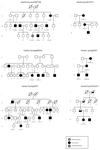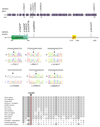Mutations of DEPDC5 cause autosomal dominant focal epilepsies
- PMID: 23542701
- PMCID: PMC5010101
- DOI: 10.1038/ng.2601
Mutations of DEPDC5 cause autosomal dominant focal epilepsies
Abstract
The main familial focal epilepsies are autosomal dominant nocturnal frontal lobe epilepsy, familial temporal lobe epilepsy and familial focal epilepsy with variable foci. A frameshift mutation in the DEPDC5 gene (encoding DEP domain-containing protein 5) was identified in a family with focal epilepsy with variable foci by linkage analysis and exome sequencing. Subsequent pyrosequencing of DEPDC5 in a cohort of 15 additional families with focal epilepsies identified 4 nonsense mutations and 1 missense mutation. Our findings provided evidence of frequent (37%) loss-of-function mutations in DEPDC5 associated with a broad spectrum of focal epilepsies. The implication of a DEP (Dishevelled, Egl-10 and Pleckstrin) domain-containing protein that may be involved in membrane trafficking and/or G protein signaling opens new avenues for research.
Conflict of interest statement
The authors declare no competing financial interests.
Figures


Comment in
-
Novel DEPDC5 mutations causing familial focal epilepsy with variable foci identified.Clin Genet. 2013 Oct;84(4):341-2. doi: 10.1111/cge.12239. Epub 2013 Aug 21. Clin Genet. 2013. PMID: 23869883 No abstract available.
Similar articles
-
Mutations in DEPDC5 cause familial focal epilepsy with variable foci.Nat Genet. 2013 May;45(5):546-51. doi: 10.1038/ng.2599. Epub 2013 Mar 31. Nat Genet. 2013. PMID: 23542697
-
Novel DEPDC5 mutations causing familial focal epilepsy with variable foci identified.Clin Genet. 2013 Oct;84(4):341-2. doi: 10.1111/cge.12239. Epub 2013 Aug 21. Clin Genet. 2013. PMID: 23869883 No abstract available.
-
DEPDC5 mutations in familial and sporadic focal epilepsy.Clin Genet. 2017 Oct;92(4):397-404. doi: 10.1111/cge.12992. Epub 2017 Mar 30. Clin Genet. 2017. PMID: 28170089
-
Magnetoencephalogram-assisted diagnosis of familial focal epilepsy with variable foci in a Chinese family with a novel DEPDC5 mutation.Epileptic Disord. 2019 Jun 1;21(3):289-294. doi: 10.1684/epd.2019.1066. Epileptic Disord. 2019. PMID: 31225799 Review.
-
Genetics advances in autosomal dominant focal epilepsies: focus on DEPDC5.Prog Brain Res. 2014;213:123-39. doi: 10.1016/B978-0-444-63326-2.00007-7. Prog Brain Res. 2014. PMID: 25194487 Review.
Cited by
-
SEA you later alli-GATOR--a dynamic regulator of the TORC1 stress response pathway.J Cell Sci. 2015 Jun 15;128(12):2219-28. doi: 10.1242/jcs.168922. Epub 2015 May 1. J Cell Sci. 2015. PMID: 25934700 Free PMC article. Review.
-
Molecular typing of familial temporal lobe epilepsy.World J Psychiatry. 2022 Jan 19;12(1):98-107. doi: 10.5498/wjp.v12.i1.98. eCollection 2022 Jan 19. World J Psychiatry. 2022. PMID: 35111581 Free PMC article. Review.
-
Molecular regulation of brain metabolism underlying circadian epilepsy.Epilepsia. 2021 Feb;62 Suppl 1(Suppl 1):S32-S48. doi: 10.1111/epi.16796. Epub 2021 Jan 4. Epilepsia. 2021. PMID: 33395505 Free PMC article. Review.
-
Ragopathies and the rising influence of RagGTPases on human diseases.Nat Commun. 2024 Jul 10;15(1):5812. doi: 10.1038/s41467-024-50034-4. Nat Commun. 2024. PMID: 38987251 Free PMC article. Review.
-
Contribution of ultrarare variants in mTOR pathway genes to sporadic focal epilepsies.Ann Clin Transl Neurol. 2019 Feb 25;6(3):475-485. doi: 10.1002/acn3.722. eCollection 2019 Mar. Ann Clin Transl Neurol. 2019. PMID: 30911571 Free PMC article.
References
-
- Scheffer IE, et al. Autosomal dominant nocturnal frontal lobe epilepsy. A distinctive clinical disorder. Brain. 1995;118:61–73. - PubMed
-
- Berkovic SF, et al. Familial temporal lobe epilepsy: a common disorder identified in twins. Ann Neurol. 1996;40:227–35. - PubMed
-
- Klein KM, et al. Familial focal epilepsy with variable foci mapped to chromosome 22q12: expansion of the phenotypic spectrum. Epilepsia. 2012;53:e151–5. - PubMed
-
- Baulac S, Baulac M. Advances on the genetics of mendelian idiopathic epilepsies. Clin Lab Med. 2010;30:911–929. - PubMed
Publication types
MeSH terms
Substances
Grants and funding
LinkOut - more resources
Full Text Sources
Other Literature Sources
Medical
Molecular Biology Databases

